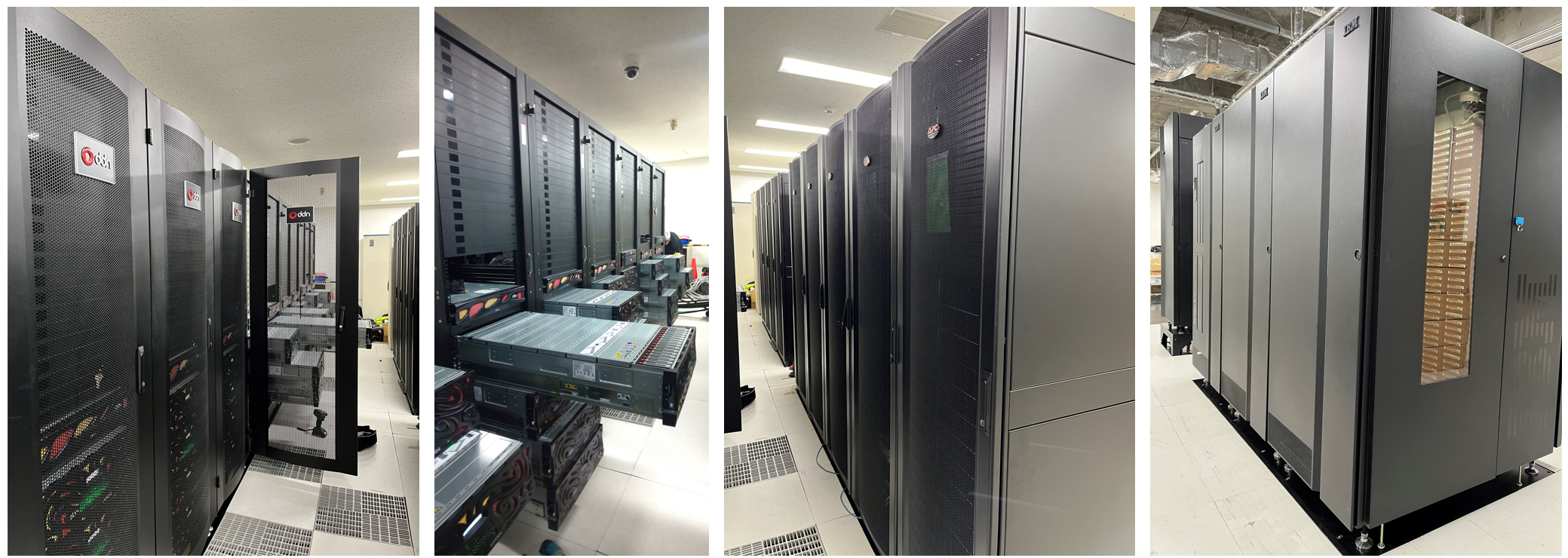NIG Supercomputer (2019 => 2025)
The National Institute of Genetics (NIG) provides a cutting-edge supercomputer system equipped with large-scale cluster-based computation, large-scale shared memory computation, and high-capacity high-speed disk devices, serving as a large-scale computational infrastructure for information processing in life sciences and medical research.

Due to limited disk capacity, the research institute does not back up data in users' home directories. Users are responsible for backing up their data.
Featured News
Due to the power outage caused by lightning around 13:40 on Friday, September 5, 2025, the NIG supercomputer had been out of service. However, the login service was resumed at 12:00 on Tuesday, September 9, 2025. (For dedicated VMs that had not been confirmed to be running as of 12:00 on September 9, all of them were successfully restarted by 15:00 on Wednesday, September 10.)
- (Restored) [Outage] Slurm Outage in General Analysis Division on Thursday, December 25, 2025 (December 25, 2025) \ 🆕 /
- March 13 - March 19, 2026: Regular Maintenance (December 16, 2025)
- Important Announcement from the NIG supercomputer: 2nd Period of 2025 (August-November) (November 18, 2025)
- (Ended) Supercomputer Service Suspension (6th November 2025, 8:00 AM – 10th November 2025, Morning) due to NIG Power Restoration Following 5th September Lightning Strike (October 16, 2025)
- (Postponed) Supercomputer Service Suspension (24th–27th October 2025) due to NIG Power Restoration Following 5th September Lightning Strike (September 30, 2025)
- Notice of Discontinuation of Rhelixa Graphing Tool (RIAS Visualisation) by 31 October 2025 (September 29, 2025)
- (Resolved) [Outage] SSH Connection Disruption on General Analysis Gateway Node on Tuesday, July 29, 2025 (July 29, 2025)
Year-End Account Renewal Applications
The account application system is currently being revised for security enhancements, which is causing a delay in its reopening. Account renewal applications will be processed after the system is reopened. For 2024FY, account renewal for the supercomputer(2025) will be handled by the supercomputer administrator without use's application.
Regular Maintenance in Fiscal Year 2025
The Regular maintenance for the 2025 financial year will be carried out from Friday, 13 March 2026 to Thursday, 19 March 2026.
For further details, please refer to the information below.
Temporary Suspension of New Account Registrations for Large-Scale Users in General and Personal Genome Analysis Areas (May 13, 2022)
Thank you for using the NIG supercomputer.
Due to the supercomputer's computational resources being highly constrained in terms of both CPU and disk, new account registrations for the following users will be temporarily suspended:
- Large-scale users in the general analysis area
- Users in the personal genome analysis area
The following applications will continue to be accepted:
- Additional resource usage requests for users who are already large-scale users in the general analysis area or personal genome analysis area.
- Regular user registrations for the general analysis area. In this case, disk usage is limited to an initial setting of up to 1TB.
- Applications for workshop usage will also continue to be accepted.
However, we ask for your understanding as it may not always be possible to meet your requests.
The resumption of new account registrations will be decided based on the availability of computational resources. Updates on the availability will be published on the homepage every four months. Prospective users are requested to refer to these updates and submit their usage plans in advance. Please note that the availability forecasts are not guaranteed, and requests may not always be fulfilled.
Acknowledgements
The activities of the NIG supercomputer system are evaluated through the acknowledgements received. If a paper utilizing this supercomputer system is accepted, please include an acknowledgement using the examples below.
Examples:
==============================================
<English Acknowledgement>
Computations were partially performed on the NIG supercomputer
at ROIS National Institute of Genetics.
==============================================
<Japanese Acknowledgement>
本研究は、情報・システム研究機構 国立遺伝学研究所が
有する遺伝研スーパーコンピュータシステムを利用しました。
================================================

